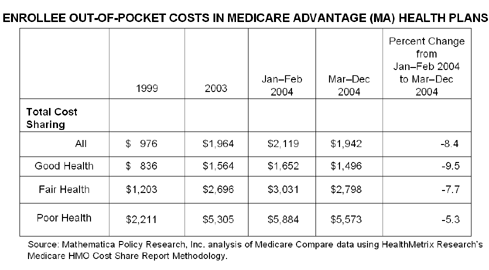New York City, December 10, 2004—A new report from The Commonwealth Fund analyzes how private Medicare Advantage (MA) plans used increased funding enacted as part of the Medicare Prescription Drug, Improvement, and Modernization Act of 2003 (MMA). The MMA gave private plans a 7.4% increase over what they were originally slated to receive in 2004, an increase of 10.9% over what they received in 2003. The 12.7 percent of Medicare beneficiaries enrolled in private plans stood to benefit from the increase in funding. About half of the MMA increase MA plans received went directly to MA enrollees mainly in the form of reduced premiums, and nearly half (42%) went to providers. Lori Achman and Marsha Gold of Mathematica Policy Research, Inc. have been tracking trends in benefits and premiums in the MA program (formerly called Medicare Plus Choice) since 1999. In Are the 2004 Payment Increases Helping to Stem Medicare Advantage's Benefit Erosion?, Achman and Gold find that after four years of reduced benefits and increasing premium costs in MA plans, enrollees saw modest improvements in 2004, including reductions in premiums, some increased benefits, and overall enrollee cost-sharing reduced to about the same level as in 2003. However, enrollees in poor health did not benefit from the decrease in out-of-pocket costs at the same rate as those in good health. Benefit improvements made with funding from enactment of the MMA resulted in an average monthly premium reduction of $9 between January 2004 and March 2004, when the additional funding went into effect. From 1999 to 2003 MA premiums increased dramatically. While they had already begun to decrease in 2004, the MMA reinforced this trend. Some benefits improved in 2004: the trend toward generic-only drug coverage was reversed, although overall levels of drug coverage remained restricted by annual limits. The effect of the funding increase varied according to the health status of enrollees. Although all managed care enrollees received about the same dollar benefit, healthier enrollees experienced a higher percentage decrease in out-of-pocket costs in 2004 (9.5%) compared to those in poor health (5.3%). While all enrollees pay the same premium regardless of their health status, out-of-pocket cost sharing is much higher for those who are in poor health and use more care. Out-of-pocket spending for enrollees in poor health remained 3.7 times greater than their healthier counterparts even after the changes in payment.



